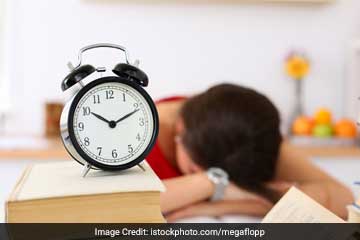Its exam time again! Time for sleepless nights, revision stress, sample papers and lots of tension! Most students sweat as the date of examinations approaches. To increase productivity and take the exams well, it is necessary - besides studying hard to reduce the stress by focusing on eating habits, sleep patterns, mental and physical fitness.

As soon as you notice you are losing concentration, take a short break to beat the stress.
Eat right - A balanced diet is important, especially during examinations. Fresh fruits and vegetables provide reserves of energy and boost your ability to concentrate. Avoid lots of processed, sugary foods like cereal, biscuits, sweets and chocolate. Lean protein like chicken, egg, plenty of veg and carbs that release their energy slowly like wholegrain bread, rice and pasta will keep energy levels steady. Pulses like chickpeas and lentils are great since they contain both protein and slow-release carbs. Excess tea, coffee and chocolates should also be avoided. These may stimulate you temporarily, but they will also get you tired.
Take care of your eyes - Examination time means a lot of reading, writing and strain. Make sure not to overexert or strain your eyes. Make sure there is ample light in the room when you are studying. Reading with a night lamp is a strict no-no. Avoid leaning on the table or reading in the sleeping position for a long time as it will strain your eyes. Rest your eyes every half an hour or so; blinking also helps. Avoid rubbing the eyes. Splash your eyes with cold water at regular intervals.
Get adequate sleep - Do not compromise on sleep. A sound sleep of at least 6-7 hours is vital during exam days. Staying awake all night to study before the exam is not a good idea as it will make you feel tired and sluggish during the exam.
Practice relaxation exercises - Practice deep breathing exercises, meditation, and other relaxation exercises as part of your daily routine during the examinations. This will not only help you kill the examination stress but also help you concentrate more and learn quickly.
Take small breaks - As soon as you notice you are losing concentration, take a short break. During your break-time, you could take a stroll, listen to some relaxing music or just take a short nap of 15 minutes. This will help your feel refreshed and you would be able to concentrate on your studies again in a better way. Take breaks to stay refreshed. Instead of cramming in more revision or, indeed, stressing over how to deal with exam stress, the best thing might simply be to do something completely different.
Get active - Exercise, physical exercise like running, jogging, skipping for 15-20 minutes a day will help you feel stress free and mentally fit.
Be prepared and make a plan - Make sure you know what you are supposed to have learned and that you have all your notes and books. Working out how much time you have to revise and planning how you can use it best by making a timetable is a key factor in how to deal with exam stress. Another technique recommended by all time management experts is taking what feels like an overwhelming task and breaking it down into manageable chunks.
Know when and where you work best - Work when you are most alert. We all have slightly different body clocks - do you learn better at night or during the day? Everyone has different revision styles - wherever you feel calm and in control is the best place for dealing with exam stress.
Talk about it with someone - Almost everyone finds exams stressful so you should know that you aren't alone. Expressing your worries to a good friend, family member, a teacher or a counsellor will help.
Disclaimer: This content including advice provides generic information only. It is in no way a substitute for qualified medical opinion. Always consult a specialist or your own doctor for more information. NDTV does not claim responsibility for this information.
DoctorNDTV is the one stop site for all your health needs providing the most credible health information, health news and tips with expert advice on healthy living, diet plans, informative videos etc. You can get the most relevant and accurate info you need about health problems like diabetes, cancer, pregnancy, HIV and AIDS, weight loss and many other lifestyle diseases. We have a panel of over 350 experts who help us develop content by giving their valuable inputs and bringing to us the latest in the world of healthcare.












